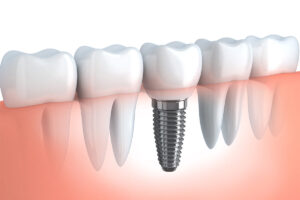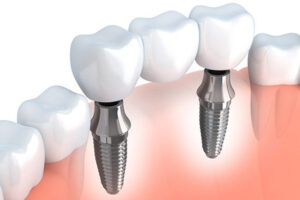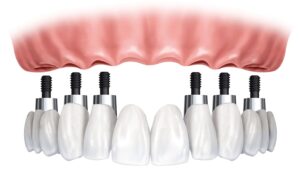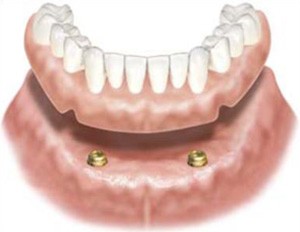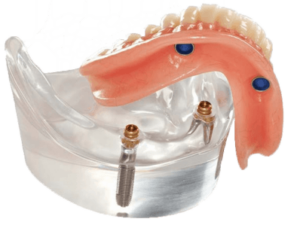At McOmber Dental, all dental implants are placed by our Board Certified Periodontist, Dr. Kenneth Gluck, DMD, MDS.
Dr. Gluck is a clinical assistant professor at Rutgers School of Dental Medicine and has trained extensively in implant surgery and its associated procedures. He has successfully placed literally thousands of implants. He has had the opportunity to train on five of the top implant systems and is familiar with the strengths and weaknesses of a variety of implant manufacturers. But what is a dental implant, and why might it be right for you?
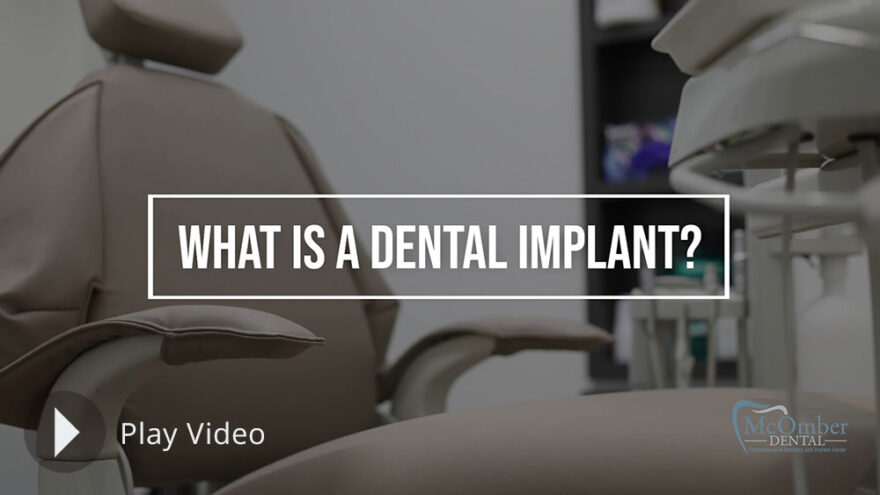
Dental Implants
Dental implants are a long-term solution for replacing missing teeth. They can provide a stable foundation for artificial teeth, improve oral health, and prevent bone loss in the jaw. Dental implants consist of a titanium post that is surgically inserted into the jawbone. The post either retains dentures or is fitted with a crown to act as a strong, natural-looking tooth.
Implants have revolutionized the dental field in terms of how we plan treatment and restore missing teeth. The result is a beautiful, natural-looking tooth that functions like your real teeth and will allow you to smile with confidence.
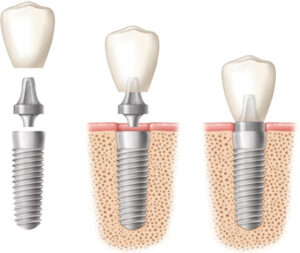
Dental Implant – Components
A dental implant to replace a single missing tooth is made up of three components:
- Implant (the anchor in the bone that acts as an artificial root.)
- Crown (the “tooth” part that is usually made of porcelain/ceramic and/or metal.)
- Abutment (the middle component that connects the two above-mentioned parts.)
What Are the Benefits of Dental Implants?
Dental implants are a popular choice for replacing missing teeth due to the many advantages they have over other options. Here are some of the key benefits:
- Natural-Looking & Long-Lasting: Dental implants are designed to look, feel, and function like your natural teeth. They are also very durable and can last a lifetime. Dental implants are not affected by tooth decay, making them a good choice for cavity-prone patients.
- Improved Oral Health: Implants preserve more of your natural tooth structure, help prevent bone loss, and maintain jawbone integrity.
- Permanent Fit: The permanency of implants eliminates the discomfort of dentures, which can slip.
- Easier Eating: Dental implants allow you to eat your favorite foods with confidence and without pain.
Before dental implants, if a patient was missing a single tooth, the adjacent teeth would have to be shaved down by drilling away the outer tooth structure, the enamel, thereby weakening the teeth. This would create two stumps that could then have three crowns cemented on to create the illusion of a natural tooth in the middle, called a “bridge.” However, because the three crowns are one unit (see below), you cannot floss between the teeth, meaning home care will be more difficult and time-consuming.
With dental implants, the adjacent teeth do not have to be altered, thereby preserving their structural integrity. Additionally, because the dental implant does not involve neighboring teeth, such as with a bridge, you can floss between them as you would natural teeth, keeping things clean and healthy.
Bridge vs. Implant:
Another drawback to the dental bridge is the possibility of a cavity forming under the bridge, which usually necessitates the entire bridge to be removed and replaced. The dental implant, which is made of artificial material, is not subject to dental decay. Patients who have a long history of cavities should consider dental implants over the conventional fixed bridge for any missing teeth.
Dental Implant – Applications
A dental implant can replace a single missing tooth or multiple missing teeth, aid in the retention of partial or complete dentures, and even retain a full arch of fixed replacement teeth.
Implant Overdentures
Dental implants are very beneficial to help stabilize dentures. A common practice is to place 2 implants in the lower jaw and then anchor a removable denture onto them. This is often a more budget-friendly option than a full arch of implants and offers great benefits.
Long-time denture patients will notice that their dentures will get progressively looser with time. This is due to bone loss in the jaws when no teeth are present. Placing just two implants will not only preserve the jaw bone but stabilize the existing denture by converting it to an implant overdenture.
What is the Dental Implant Procedure?
Following an initial evaluation, Dr Gluck initiates the treatment by placing a titanium post into your jawbone, which serves as the new root for your tooth. After a few months of healing, it will be fused to the bone, where an abutment and crown will be attached. Dr. McOmber and Dr. Gluck coordinate the patient’s care from start to finish, working as a team to ensure that the treatment will be effective.
Additionally, we have adopted innovative practices for dental implants, including detailed X-ray machines that take two- and three-dimensional scans of the jaw, allowing us to see the area for the procedure. We can then make a precise punch, place the implant in the exact location, and proceed as usual without extensive incisions. Immediate implant placement after tooth extraction is another common practice at McOmber Dental. Both doctors are extensively trained in the technique of immediate temporization, where a temporary tooth is placed the day the implant is inserted into the jaw. This avoids the need for removable retainers during the healing phase.
Frequently Asked Questions
Unsurprisingly, many people have questions about dental implants and the implant process. Here are answers for a few of the most commonly asked ones:
1. Are Tooth Implants Painful?
Dental implant procedures require local anesthesia (the kind that numbs the area) and sometimes sedation (either light sedation or sleep) to alleviate patient anxiety. After the procedure, patients often feel only minor discomfort, if any. Over-the-counter pain medications are usually sufficient to alleviate any soreness in the area.
2. Am I a Candidate for Dental Implants?
Fortunately, there are only a few absolute contraindications for dental implant placement. Your surgeon will meet with you to review your medical/social history and determine if you are a candidate.
3. How Successful are They?
The literature reports approximately a 96-97% success rate. However, there can be diminished success for heavy smokers, uncontrolled diabetics, or immunocompromised patients. Your surgeon will discuss all risks with you at the consultation visit.
4. Is Age a Factor in the Success of the Treatment?
Not necessarily; if you are a healthy patient without risk factors, dental implants will allow for a better quality of life regardless of age. We have placed implants in patients well into their 80’s and 90’s.
5. I am on Blood Thinners. Can I Still Get Implants?
Usually, yes. Dr. Gluck will consult with your physician/cardiologist to determine the safest way to treat you.
6. How Much Do Dental Implants Cost?
The cost of dental implants varies depending on the overall treatment plan. Ancillary procedures like bone grafting and sinus elevation might need to be incorporated into your treatment plan for the implants to be placed in sufficient bone. At your consultation visit, the complexity of your particular case will be discussed, and the associated fees will be reviewed with you in detail.
7. Do I Have to Change My Diet?
Immediately after your dental implant surgery, you will need to eat soft foods until the implants heal. You should especially avoid hard or sticky foods, which could damage the implants.
8. How Do I Care for My Dental Implants?
Caring for dental implants is similar to caring for your natural teeth, involving practices such as:
- Brush Twice a Day: Use a soft-bristle toothbrush and a non-abrasive toothpaste to clean your teeth and implants gently.
- Floss Daily: Use appropriate floss to remove plaque and food particles between the teeth and around the implant.
- Regular Dental Visits: Visit your dentist regularly for cleanings and exams to ensure the implants are in good condition.
- Avoid Certain Foods: Avoid chewing on hard items like ice or hard candy that can damage the crown and the natural teeth.
High-Quality Dental Implants
Dental Implant treatment is often the very best standard of care when replacing missing teeth. At McOmber Dental, all dental implants are placed by our board-certified periodontist, Dr. Kenneth Gluck. Successful dental implant treatment requires the use of high-quality implants, which are precision-crafted titanium anchors placed into the bone that act as artificial roots, along with high-quality custom abutments, which are components that connect the implant to a crown.
All Dental Implants and Components are Not Created Equal.
There is an extremely significant difference in the quality of dental implants and components used by dentists. In order to provide lower fees to increase their business and maximize profits, some dentists use inferior implants and components. Many patients are unaware that the quality of the implants and components matters; they will often seek out the lowest-cost implants they can find, frequently resulting in either a poor outcome or the need to redo treatment later.
No Low-Quality “Knock-Offs”
It is vital to remember that dental implants and components are implantable medical devices. At McOmber Dental, we will never compromise patient care by utilizing “knock-off” or copycat generic implants and components. We only use dental implants manufactured by two of the leading companies in medical and dental prosthetics, ZimVie, and Straumann. When considering implant treatment, it is important for patients to always inquire as to what kind of implants and components are used by any dental practice.
High-Quality Implants at Competitive Prices
We never sacrifice patient care by using low-quality materials or components; our implant pricing is extremely competitive because we are able to offer a cohesive and complete approach to surgical and restorative treatment- all under one roof. We also bundle treatment costs to make treatment more affordable for our patients. Contact our office for a complimentary visit with our doctors and staff for more complete pricing, treatment options, and details.



